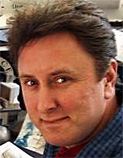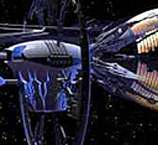|
Peter Rubin
–
digital artist and animator
|

|
"
Inspiration is the thing that happens between thoughts.
" |

|
| |
|
|
|
| |
How were you motivated to become an artist? What can you share about your creative process? And what ideas do you have for a future human community on Mars? |
| |
What made me the artist I am? It seems that I came to my profession almost by accident, that somehow I made a wish on a dim rosy star as a boy, and now, thirty years later, I make my living designing space vehicles and visual effects for movies. It's a dream, and if I stop to think about it, I can get lost in the sheer wonder of it.
I don't mean to sound vague, or mystical, about it, but that's the truth of what happened. I did the homework; I developed my skills as an artist from infancy; I taught myself to use a computer when no one else in my field was using one. But the career choices I made along the way were on the face of them so wrongheaded it's astonishing I got here at all. I spent a good dozen years as an actor, for crying out loud. But when I was ready, my subconscious
made a call, and the universe answered. It's similar to the way I think most artists work. Inspiration is the thing that happens between thoughts. The ancient Greeks believed that Heaven worked directly through the artist's arm, connecting, in some divine firewire linkup, through the top of the shoulder and bypassing the head altogether. I'm not sure they were wrong. When I sit down to create a new image, or design a creature or a craft, I imagine first of how I want the audience to feel when they see it; research into function and precedent takes place concurrently, and is married with vision as I go along. The best ideas sneak up on you when you're thinking about other things.
|
|

|
| |
|
|
|
| |
|
| |

|
|
I suppose I ought to point to my artist heroes, the filmmakers, cartoonists, painters and others whose work I rely on daily for direction and regularly steal from. But what I think of first is not them. I think of a book.
My mother picked it up for me one day when I was eleven or so, home sick from school. Musty, slightly yellowish pages, a library sticker low on the binding, a line drawing on the cover. The drawing is of a boy about my age, wearing a glass helmet, one foot up on a rocky ridge, looking across a dry valley floor toward some domed buildings.
Red Planet, by Robert A. Heinlein.
It was a story about a kid living in a Martian colony. This was my introduction to what I think of as "real" science fiction, and to the very idea that this site celebrates.
Later, there were others. Asimov, Bradbury, Clarke, Herbert, LeGuin, Matheson, Silverberg, countless more. I loved those books, the stories, and the covers! The cheap paper ones, especially, dozens of them, the ones my grandfather stowed in a big cardboard box marked Pennzoil in his garage. I don't know whether he intended to inspire me or just get me out of his hair, but I stared at them, alternating with the words inside, for hours, imagining
myself into them, the slim silver ships and the giant rotating rings of the orbiting stations, the black dense nothing beyond. The alien faces, some sinister, some benevolent, the heroic adventurers with their laughably thin, useless spacesuits and painfully serious expressions.
Then Neil Armstrong was on his way to the moon. I knew all the facts, the number of the crew, the heavy pressure suits, the squat, spider–legged form of the lunar craft, how long it would take to get there. I knew all that stuff, and was thrilled beyond belief, but I also knew it was a test, a stop–off, a dry run on a little gray rock that, after all, is already ours. The real destination, the place where it all will happen, where human history will really begin, is a little further away.
|
|
| |
|
|
|
| |
|
| |
OK, so Mars isn't the home of little green men, big sentient cold–minded mollusks or beautiful, sad alien women with eyes like gold coins. But I still believe in Martians. They aren't there now. They probably weren't there eons ago. But they will be. They are our children.
What will life be like on Mars? Hard, worse than we can imagine, in some ways. Here, a leak in the roof means we get a little damp. On Mars, asphyxiation. Transforming, terraforming, a planet like Mars into a welcoming environment will be very difficult, very expensive, and take decades, perhaps centuries. At best, we may make Mars approximate a cold night in Death Valley. There may never be rain forests. Hard, but perhaps in some ways, better. The colonists would have to learn to work together for the common good in ways that we seem to have forgotten. They would have to teach their children
very carefully how to live and survive and care for each other. They will not have, at first, the luxury of consumerism. I imagine enclosed living spaces, homes and offices and town squares, with membranes of polymer stretched over framework made of compounds we haven't invented yet holding everyone's air inside. The careless firing of a gun would be suicide.
And what will be my role, that of the artist, the craftsman, the entertainer, on Mars? Frankly, that doesn't worry me. Art is not something that just hangs on the wall, functionless. The artist, the designer, is with us every moment of every day. You don't even make toast without having been touched by someone's efforts at design, someone's attempt, however slight, to make your life a little more beautiful. One of the best illustrators I know once pointed to a passing panel truck's side mirror and said proudly, "I did that." It will be no different on other worlds. I can hope that we will, in new places, be more conscious of and appreciate more what artists do
for us. They will become even more important as we make over new worlds into livable environments, a slow and challenging process. The work of artists, entertainers, designers and architects will be crucial to making a forbidding place like Mars into something – dry rusty soil, thin air and all – that we can call home.
And there will be, on that red planet, days spent home sick from school, and books to read.
|
|

|
|




